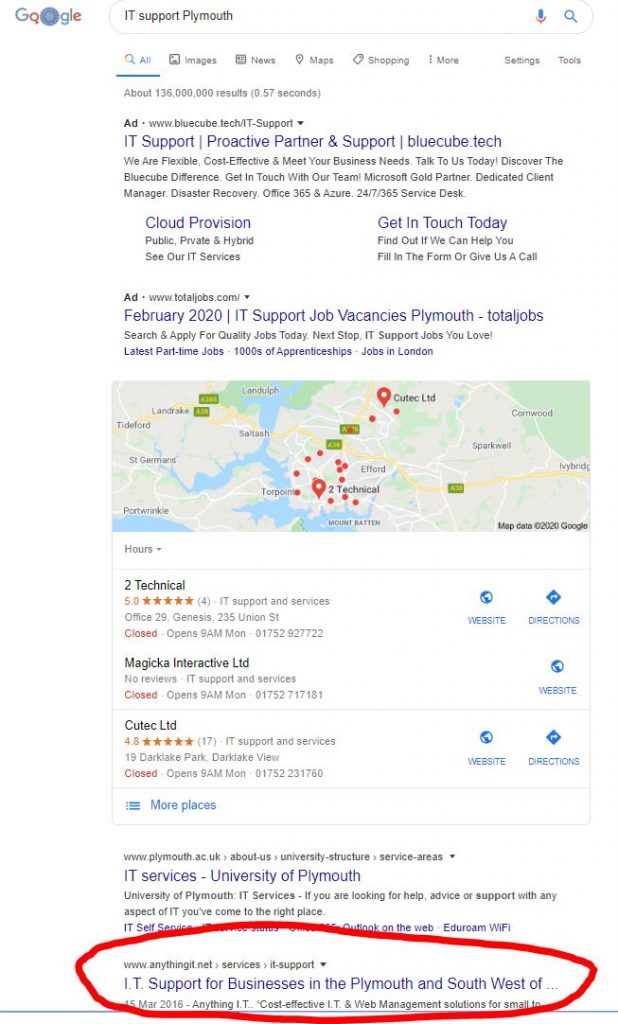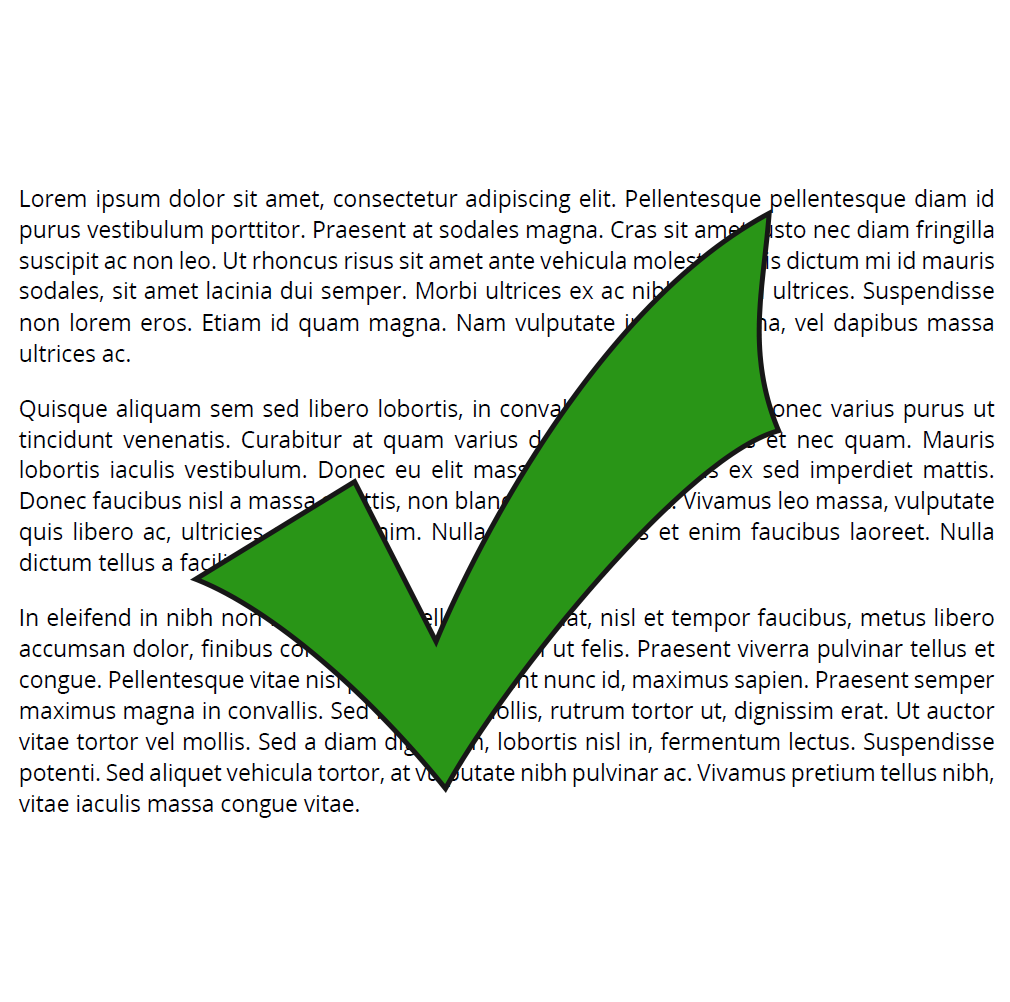Anything I.T. and the Geek Collective provide an I.T. Support service and Website design to business clients in Plymouth, South West of the UK.
Updated: 27th October 2021
Do you find yourself asking the question: “How can I improve the SEO of my website?”. Does Search Engine Optimisation (SEO) seem like a black art? Does it seem like whatever you do, nothing improves?
Perhaps you feel you don’t have time to contribute to the growth of your website?
Naturally, there are hundreds of areas that Google (and other search engines) look at when ranking your website. Many are beyond your control such as the location of the user carrying out the search or the popularity of competitor websites. There are some things you can do that are in your power though.
Now that we are coming to the end of 2021, the world has been through some challenging times. Doing business has become more a remote thing than ever before so having a decent website that potential customers can find is very important. Don’t be scared of doing some SEO yourself. Think of it as providing useful content to potential customers out there.
Read on for three tips to improve the SEO of your website.
1. Provide better content
Search engines know how long a visitor stays on your site. When a visitor stays on your site for more than just a few seconds, it can suggest that the content is interesting enough to potentially provide the information the visitor was looking for.
You are the expert
You are the expert in your field, not me. So I will leave the examples up to you to consider. BUT, what if you wrote content for your site that satisfied the visitor? Perhaps you are answering a question that they need to know the answer too? Maybe it’s a special vegetarian recipe? Perhaps your content explains to the visitor how to make a better golf swing?
Whatever it is, it is down to you to provide the information in a readable (is that a word?) way so that your site visitor does not depart quickly, going back to Google for alternative answers.
Think about the websites you visit that answer your questions or you simply enjoy reading. What is it about them that makes the site tick?
Content that answers specific questions
When answering specific questions such as pricing details, or the location of your premises, make it clear and obvious. Provide a table of pricing for your pricing structure or a map of your location with the address clearly visible.
There’s nothing worse than a searcher landing on your website to find the address of your premises, not finding it so going back to Google and clicking on another website (say Yell for instance) that does show your address. What do you think Google is thinking about that simple question? It’s not good.
Some sites sell stuff online. So, okay writing stories or articles for these sites might not be the best way forward, but you should ensure that each product text is well written and clear. This will help people stay on the site and encourage people to stay longer and even purchase!
Be the giver
Providing good content in Google’s eyes has a lot to do with what you give the visitor. If you write stuff that is useful then you are one step closer to SEO heaven. Google will also look at links you provide in your copy. you need to create internal links (links to other pages on your site) in your copy, and also links to external sources that might enhance what you have written.
For instance, in SEO circles I often refer to Neil Patel since he is undoubtedly an expert in this field. Some of the videos he produces are spot on so it’s worth checking him out.
How many words should my blog post or article have?
There’s quite a degree of difference of opinion on this one. From 500-800 words to 1800-2000+ words! At the end of the day you need to consider your potential visitor to the blog, and specifically the blog article you are writing right there and then. Perhaps it doesn’t actually need 2000 words? Perhaps 500 would do? Once again, you should be the judge of that.
2. Consider the structure of your content
Don’t write content that is hard to read. Here’s hoping that this post can be read easily otherwise I’m in trouble!
What I mean by structure is that you should write content that is broken up nicely into paragraphs and sectioned off with appropriately titled headings.
Don’t write a 1000 word article with no paragraphs!
Maybe it needs images or a video to help get your point across. Images can break up the content making it easier on the eyes. Try it!
3. Write more often, and regularly
You think it’s okay to write a new article every six months, do you? Sorry, but if you want to have a non-technical impact on your website, then you need to produce new content or update old content at regular intervals.
Not all websites benefit from writing content such as news stories, articles or tips and tricks. But, if you are not an SEO expert then writing could be the way forward for you. See below about how it has affected our website for a real-life example
How often should I create new content?
The old adage of ‘How long is a piece of string’ comes to mind. It’s whatever suits you and your business. if your content is long and complex to write, then once or twice a month might be enough. If you writer shorter snippets of copy, then several times a week might be the way to go.
What we have done
For us, at Anything I.T. we had several aims one year ago to raise our standing on the search engines. I’m happy to say that we are making excellent progress towards these goals.
The number of visitors has risen by twofold and our rankings for chosen keyword phrases have increased to the point where two are consistently on page 1 of Google results and the others are slowly rising as well.
Below is a search result for “IT Support Plymouth”. It’s lovely to see our site second only to the University of Plymouth (after the adverts and location results of course). One year ago we were on page 10!

How have we done this?
You might notice from the Blog section of our site that we have written around 17 blogs in the last year and a bit. Most of which are fairly in-depth technical articles and tips. FREE stuff we want to share with other small business owners out there.
Not only do we write these blogs but we share them on social media and encourage discussion by asking questions that don’t prompt yes or no answers. Getting into discussion with people and providing free stuff for others has been one of the aims of the blog writing.
Like I said earlier, blogging is not for everyone but I would strongly suggest looking at it.
The Geek Collective
SEO or Search Engine Optimisation is just one of the services that Anything I.T. and its colleagues within the Geek Collective provide.
Simon Pykett of the Geek Collective is particularly adept at onsite SEO and is a website design and SEO freelancer.
Neil Tancock is a specialist in providing telecoms and computing help for businesses across the UK. And we have him in Plymouth!
Jonathan Burrows (that’s me!) is a systems and support guy.
Quote: “The Geek Collective is an established and credible body of industry professionals who are expert in their specific arena. We are distinct in how we deliver our services and we have come together as professional individuals, to provide our highly trusted services as one collective.”
Source: https://geekcollective.co.uk/














